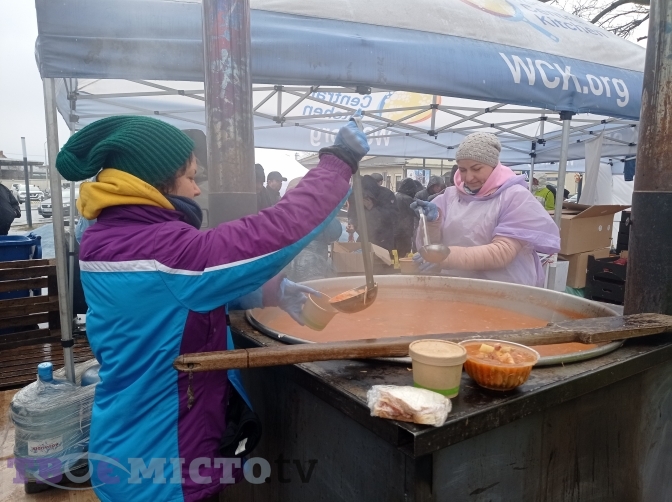
[For urgent updates please follow Ukrainian Freedom News in Telegram]
Working since the first days of the full-scale war
It’s easy to find and get to the field kitchen near the Lviv railway station. In the square near the benches and trees, a large green tent is immediately visible, and smoke comes from the chimney of the field furnace. Bograch is on the way – a hearty first course with meat, vegetables and spices. It will soon be distributed to residents of Kramatorsk, Kharkiv, Mariupol, Melitopol, Luhansk region, Donetsk region, who got out of the evacuation trains.
The idea of a field kitchen, according to Bohdan Nimets, the head of the «Boykivshchyna» society, director and co-owner of the «Boykivska Hostyna» restaurant, arose almost from the very beginning of the full-scale Russian invasion. Together with his friend Ivan Boyko, director of «Aria Motors-Honda», he managed to get the kitchen work up and running very quickly.
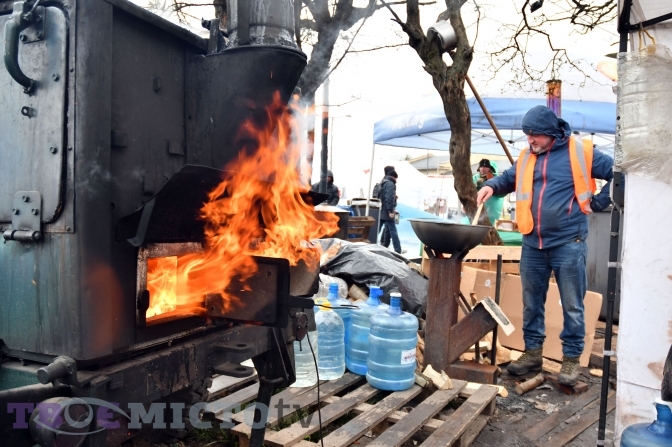
«From the very beginning of the full-scale war, we all began to think about what to do: take a machine gun or go to help in the rear. We realized that it’s best to do what we can. At first, we wanted to take the cauldron to the Ukrainian-Polish border, but people from the surrounding villages were already feeding people there. Vitalii Zahaynyi [Deputy Head of the Lviv Regional Military Administration – Ed.] suggested feeding people directly at the station. Then, the World Central Kitchen joined the field kitchen, which cooperates with the Fest Emotions Holding,» – Bohdan Nimets narrates, emphasizing several times that the field kitchen is not only his merit:» I am not alone. This all is a joint effort. «
According to the restaurateur, initially, they used the products from the restaurant, and then volunteers and caring people joined the gathering. The plan was one thing – to cook liquid hot dishes.
«Sandwiches, pies, dumplings are good, but it’s better to cook a hearty soup, one that is fatter, thicker, adds energy, satiety, warms,» – he explains.
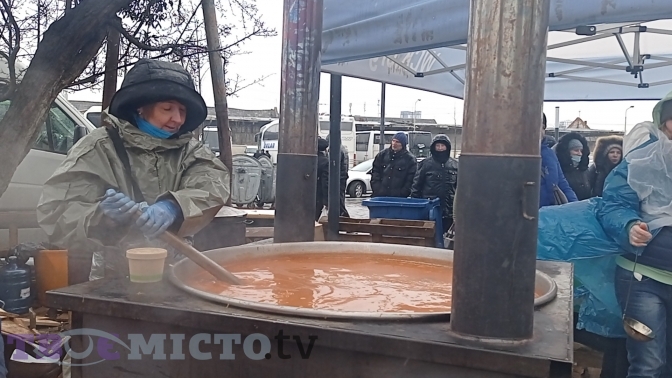
They managed to find people who would work in the field kitchen and bring food through social networks. As soon as the initiators announced about kitchen, women, girls, and boys began to arrive. Not only locals, but also those who came from other regions and found refuge in Lviv. So, 80% of the people who now work in the field kitchen are not Lviv residents. Up to 40 people work here during the day – some on a regular basis, and some come to help for a few hours.
Read also: The temporary housing for migrants to be constructed in two communities of the Lviv region
One of them is Mykhailo. He arrived in Lviv in the last days of February from Irpin, not far from Kyiv. His girlfriend from Zaporizhzhia moved in with him. At first, he didn’t want to talk to us, because «I won’t tell you anything special», but later he agreed.
«I’m just an ordinary person,» – Mikhail says shyly. The guy is a car mechanic. In Irpin, he worked at his own service station, and in Lviv, he quickly learned the intricacies of cooking.
«When planes, rockets and bombs started flying over us, I realized that we had to escape. Already here, at the station, I just approached the guys and asked if they needed help. And I am here from that time,» – the interlocutor says.
Mykhailo is responsible for the field kitchen at the station – he prepares meals and distributes them to people. Before that, he didn’t cook borscht or Bograch.
Upon arrival in our city, he joined the military registration and enlistment office. He does not want to talk about the terrible events in Irpen, which have become known now, or about his plans for the future, and he’s just going to the cauldron again, carrying a bucket of vegetables.
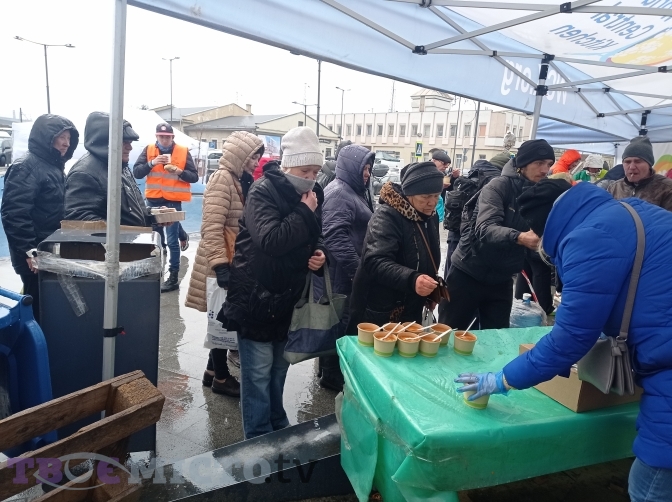
The field kitchen picks up meat, vegetables and cereals from a volunteer warehouse at the same station. Caring people brings food: someone a bag of potatoes or carrots, someone a bag of beets and onions.
«Recently, people brought a bag of garlic. They say that have heard that here we prepare food for migrants, then they give us food and leave. Sometimes we don’t even have time to thank them. Once we had a great need for meat. I told my acquaintances, and in a few hours one of them bought half a pig and brought it to us,» – Andrii Nimets says.
Initially, workers at the Boykivska Hostyna restaurant cut vegetables and meat, placed in trays and brought to the field kitchen. There were a lot of people, who cooked day and night. It was especially difficult in early March, when heavy fighting continued in other regions, and people fled.
The interlocutor clarifies: one 320-liter cauldron requires 50 kg of meat, 50 kg of potatoes and 15 kg of onions. The rest depending on the dish.
«We are currently preparing three or four 320-liter cauldrons a day, and before there were at least seven or eight of them. It took about three hours to light a fire and cook one pot of Borscht or Bograch. We realized that we should hurry, because people are hungry. World Central Kitchen helped us with this, they started cooking and supplying semi-finished products in vacuum packages. We brought everything to readiness on the spot. Now our capabilities have multiplied – we can cook a pot of bograch in 30-40 minutes,» – Andriy Nimets narrates.
We distribute food day and night
How quickly volunteers distribute hot meals depends on the influx of people. According to the interlocutor, it happened that everything volunteers distributed from the cauldron in three hours, sometimes in six or seven hours. But once they broke the record – the cauldron was empty in half an hour. Volunteers was serving the food right next to the field kitchen, carrying to the platforms where many people remained, or giving to guides who are constantly on the road. To hot dishes add sandwiches, rolls, for children – oranges, apples, cookies.
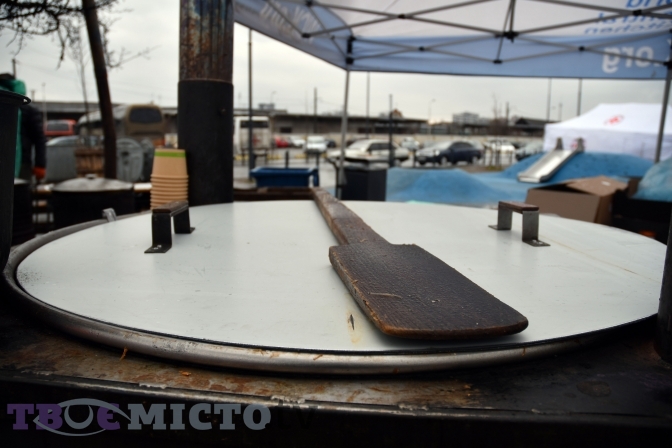
Read also: Humanitarian headquarters in the Lviv region need military equipment and food for the refugees
Yaroslav also works in the field kitchen. But unlike his colleague Mikhailo, he is involved in the kitchen, though tourist, as he is the head of an active ecological club that specializes in gastronomic tourism.
From the beginning of the full-scale war he was in the capital for another three weeks. He also organized a kitchen there, where volunteers fed people from territorial defense. Then, he returned home to his mother. He says he wants to be useful here as well.
«I already knew that a field kitchen had been set up in Lviv, so I offered a variety of dishes. At first, they cooked mostly bograch, but I offered Cossack kulish, which I cooked on the Maidan in 2014, as well as «Jewish-Bandera soup», mushroom soup, pilaf,» – the man says.
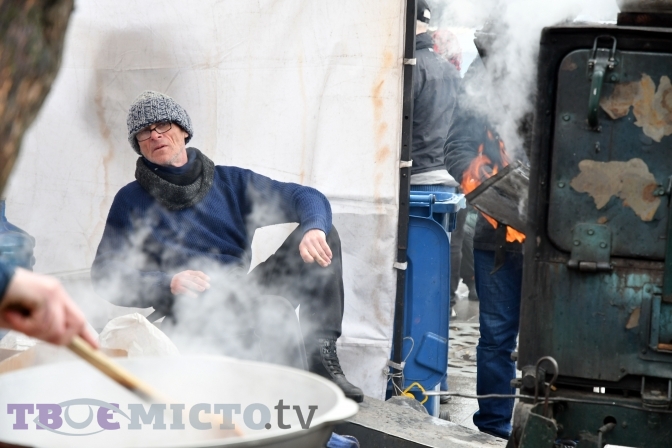
We ask the recipe of the «Jewish-Bandera soup», which was just brought to us to keep warm: it’s raining, cold and windy. According to Yaroslav, this is a red lentil soup, which is also called biblical. This «Jacob’s soup» is almost the only dish mentioned in the Bible. And it was called Jewish-Bandera here, because volunteers began to add Galician sausage and pork, although in fact it should be vegetarian.
«Haven’t eaten in weeks»
Vladyslava pours soup into a disposable dish and distributes it to the people standing in line. She is wearing a warm jacket with a hood, and from the waist to the knees wrapped in cling film: it is warmer, the film protects against wind.
Vladyslava is from Lviv, a pensioner. She came here to help; she says she will stay until the victory. Her son, who has three children, an experienced volunteer, enlisted in the army.
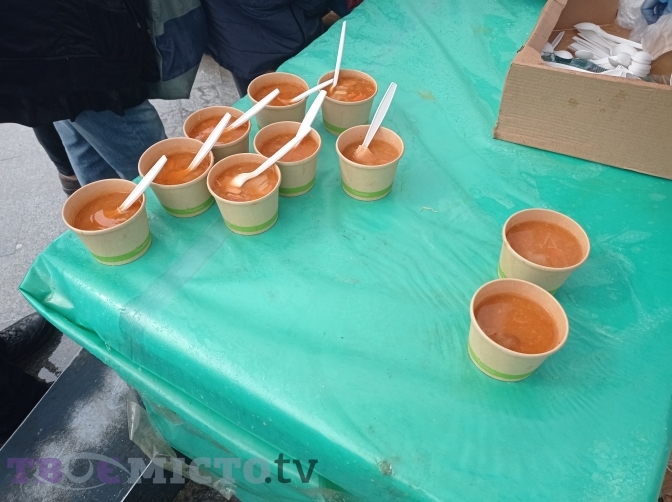
This woman is in the field kitchen every day from 9 am to 8 pm. Peels potatoes, rubs beets, pours dishes, distributes buns, tea. He wants everyone to be warm, comfortable, convenient and satisfying.
«Different people come to us – thank us sincerely, pass pictures, write poems, even give flowers. Recently, there was a family who said they had never eaten such a delicious meal before. Or they come and admit that they haven’t eaten in weeks. There are also those who complain, they say, it’s not hot, it’s not tasty…» – the woman says.
There are also «regular customers». For example, those who tried the dishes of this field kitchen on the first day of their arrival in Lviv and now come here to eat, such as Tetiana from Slovyansk. This woman arrived in Lviv a few days ago. She got there in three long days. Tetiana was housed in one of the lyceums in the opposite corner of the city, but to taste borscht or bograch, Tetiana specially comes here by tram.
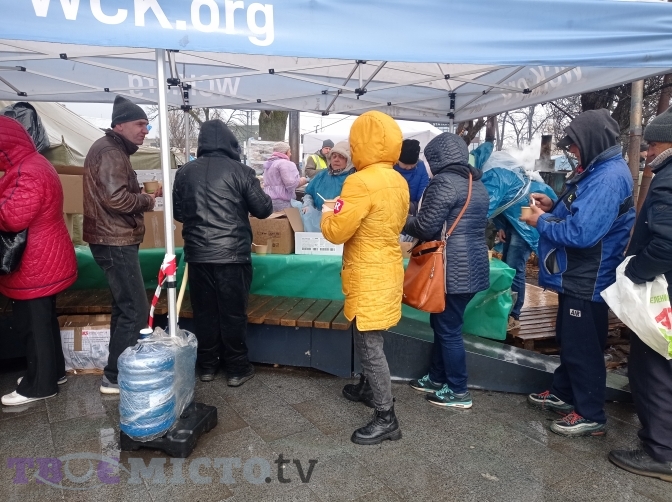
«I plan to go back. Zelensky said that he would liberate Donbas in two weeks, so I hope that will be just so,» – the woman believes.
Volunteers do not feed those who behave inappropriately or are in a state of intoxication. The same goes for the persons of Roma nationality, because they first take food and then throw it away.
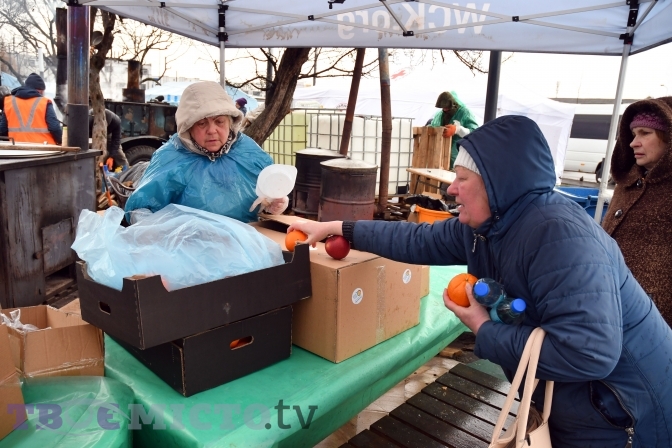
Both Ukrainian-speaking and Russian-speaking people come to the field kitchen. Those who speak Russian are asked to switch to Ukrainian and say «Glory to Ukraine!».
People who stand in line for bograch are reluctant to communicate. They also do not want to be photographed. Grandma Nina and her 14-year-old granddaughter Maryna are standing at a small table near the field kitchen. They arrived from Sloviansk on Sunday, are now temporarily living in a kindergarten, and plan to travel to Poland, perhaps Italy or the Czech Republic, in a few days. They don’t know for sure.
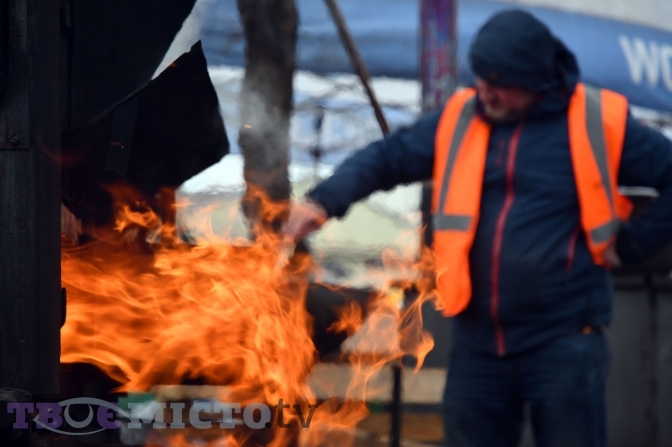
Marina’s mother in Russia. They all went there back in 2014, but the grandmother and granddaughter returned to Ukraine.
«We do not want to go to Russia. What are we to do there? I didn’t arrive earlier, because I hoped that everything would pass. We were very scared when planes and rockets started flying over us.» the woman said.
Maryna studies at her school remotely. No more than 10 children attend the classes, she wants to return home, but it is still dangerous.
The field kitchen at Lviv Railway Station is open in any weather. Here, they do not stop cooking, cutting, handing out. According to Andrii Nimets, the kitchen always needs vegetables: potatoes, onions, carrots, beets, cabbage, as well as meat – raw or smoked, firewood and water.
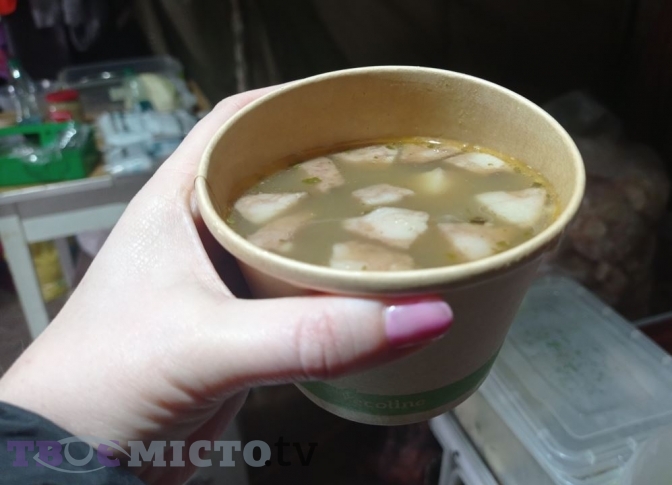
«The field kitchen is working. There are slightly fewer people now than in the first days of the war, but trains continue to carry migrants and we need to feed them. We do not know what will happen tomorrow, so we don’t intend to close the work,» – he said.
By the way, the «Jewish-Bandera soup» we were treated to is really delicious. Somewhat greasy, in my opinion, but hearty and warming.
Olha Shveda, translated by Kateryna Bortniak
Photo by the author and Ivan Stanislavskyi
Follow us on Facebook. Lviv Now is an English-language website for Lviv, Ukraine’s «tech-friendly cultural hub.» It is produced by Tvoe Misto («Your City») media-hub, which also hosts regular problem-solving public forums to benefit the city and its people.












